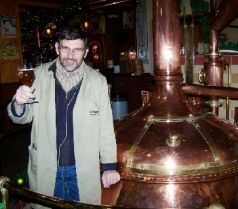 |
 |
|

|
|

|
 |
home
about
Protz
features
A-Z
books
|
|
Protz:
features
reviews
tastings
news & events
books
|

| |
Harrie's back in town
by Willard Clarke, 06/06
While the Dutch celebrate the 400th anniversary of Rembrandt�s birth, beer lovers can raise a glass and salute the return of another great artist, Vermeer. Not Jan Vermeer of Delft, but Harrie Vermeer of Tilburg, now once again firing his mash tun and copper in Amsterdam.
Those of us who have supped good beer in the Dutch capital were saddened to hear that the Brouwhuis Maximiliaan had closed. It was launched in 1992 by the brothers Albert and Casper Hoffman, who spent three years on a grand tour of the world�s great brewpubs to help plan and design their own equipment.
It then took a Dutch firm a year and half to turn the brothers� plans and sketches into glittering copper vessels that sit next to the bar area, in full view of the customers. The brewpub, with a neat touch of Amsterdam irony, was established at 6-8 Kloveniersburgwal (tel 020-4230112) in a former convent in an area that is now at the heart of the city's notorious red light district.
|
|

|
The Hoffmans had a great passion for Dutch and Belgian beer and created such complex and full-bodied warm-fermented brews as an Abbey-style Klooster or cloister ale, a Tripel in the fashion of Trappist beers, a Belgian-style spiced Wit or white beer, as well as a Kolsch, based on the ales of Cologne over the border in Germany.
For a while the brothers collaborated with Derek Walsh, a member of CAMRA Canada, who brewed a memorable interpretation of a London Porter in the Maximiliaan brewery.
The enterprise closed a couple of years ago but it has been revived by the Beiaard group, which runs a small chain of brewpubs in the Netherlands, including one in Enschede on Grolsch's home
patch (www.beiaardgroep.nl). Maximiliaan has been renamed De Bekeerde Suster or the Reformed Sister, in memory of Maria Magdalena van Bethanien, a prostitute in the Middle Ages who saw the error of her ways and joined the convent on the site. An image of the sister hangs in the bar: I doubt she would approve of the use to which her convent is now put but those of us who indulge in more prosaic pleasures can only be delighted that the brewery is operating again.
Harrie Vermeer is an immensely experienced brewer. He worked for the giant Amstel/Heineken group and, at the other end of the Richter scale, the Texelse micro-brewery off the coast of North Holland. More importantly,
he was head brewer for many years at La Trappe within the grounds of the Koningshoeven abbey near Tilburg, now restored to the Trappist brewing fraternity (see La Trappe back in the fold).

|
|
Harrie still lives in Tilburg and makes a two-hour commute, there and back, to Amsterdam to fashion his beers. His kit is based on a system widely used in the Low Countries in small craft breweries, with the mash tun
doubling as the boiling copper.
Once starch has been transformed into fermentable malt sugar, the mash is filtered in a second vessel - the lauter tun - and the liquid then returns to the mash tun where it is boiled with hops.
There are two regular beers, though Harrie will produce seasonal brews as well.
|
Blonde Ros (White Horse) is 6 per cent and is brewed with extremely pale Pils malt and three hop varieties in pellet form: East Kent Goldings, German Northern Brewer and Czech Saaz.
The beer is unfiltered and has a hazy gold colour. It has a ravishing aroma of peppery Goldings, balanced by tangerine fruit and biscuity malt. Tangy fruit, juicy malt and spicy hops fill the mouth, followed by a long, dry finish with powerful notes of hop resins and tart fruit.
Bock Ros, 6.5 per cent, is is a bock in the Dutch rather than the German tradition, made by warm fermentation and an ale yeast culture. Harrie calls it a "multi-grain beer" and uses Pils malt, caramalt (similar to British crystal), roasted grain, wheat and ginger. To this complex grist he adds two English hops, East Kent Goldings and Target.
The Bock has a massive aroma of dark and bitter chocolate underpinned by hop resins and ginger. Dark grain, raisin fruit, spicy hops and ginger dominate the palate while the finish is bitter-sweet with ginger notes developing but balanced by roast, fruit and hops.
The beers are fermented in small conical vessels in a room alongside the brewery and bar. Beer is delivered to the bar by a system of compressed air similar to that used in the Zero Degrees brewpubs in London and Bristol. The air is kept in a large bag inside a maturation tank. The bag presses down on the beer and drives the beer to the bar but doesn�t come into contact with it.
The Reformed Sister is spacious and welcoming and you can enjoy hearty Dutch dishes - kipper fillets, steaks and stews - as well as the beers.
It is heartening to find that the brewpub has found a new lease of life and especially good to discover Harrie Vermeer performing his artistry with a palette of malt and hops.
|
|
home
about
Protz
features
A-Z
books
|





